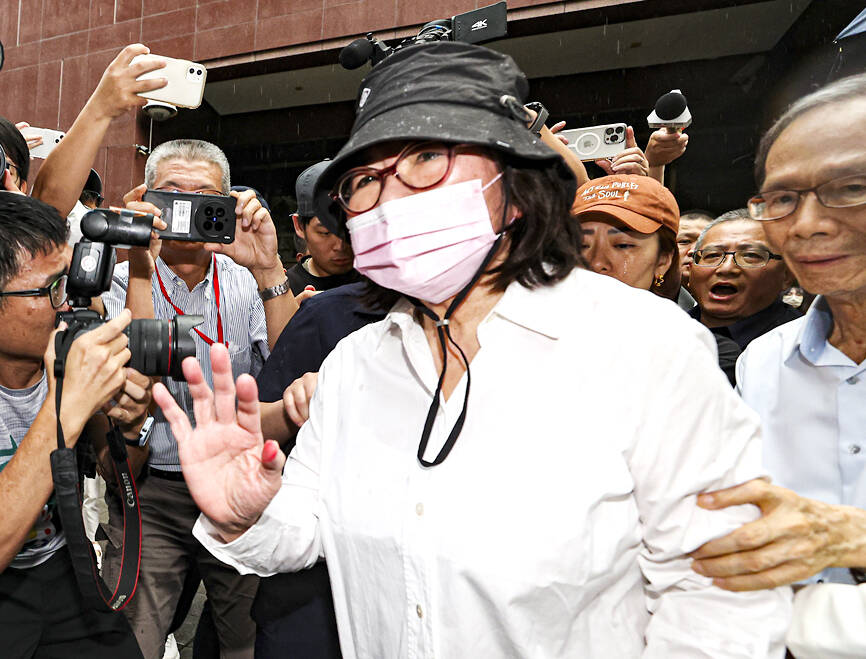Huang Lu Chin-ju (黃呂錦茹), director of the Chinese Nationalist Party’s (KMT) Taipei chapter, on Friday was released on bail of NT$10 million (US$333,056) amid an investigation into the alleged forgery of signatures in a recall campaign targeting two Democratic Progressive Party (DPP) lawmakers.
Bail was granted after she reversed her plea to guilty for all of the charges she faces.
The Taipei District Court ordered Huang Lu to wear an ankle bracelet to track her movements.

Photo: CNA
Yao Fu-wen (姚富文), the chapter’s general manager, and Chu Wen-ching (初文卿), its secretary-general, also pleaded guilty and posted bail of NT$2 million apiece.
The Taipei District Prosecutors’ Office on June 16 indicted Huang Lu, Yao and Chu for allegedly forging 5,211 signatures — 2,537 related to the bid to recall DPP Legislator Wu Pei-yi (吳沛憶), or 96 percent of the total on the petition, and 2,674 in the campaign targeting DPP Legislator Rosalia Wu (吳思瑤), or 94 percent of the total.
Huang Lu oversaw the process, the office said.
Lai Yi-jen (賴苡任), who organized the campaign targeting Rosalia Wu, pleaded not guilty.
Lai asked the court to summon four members of the recall campaign who earlier pleaded guilty and 15 volunteers who were given deferred sentences.
Lai said that the “anonymous volunteer” who claimed that he had issued an order to copy names from a list of KMT members on petition forms must step forward.
The court declined.
The 15 volunteers worked on the third floor, while Lai worked on the second, it said, adding that they were not relevant to the case.
In response to Huang Lu’s guilty plea, KMT Culture and Communications Committee head Lin Kuan-yu (林寬裕) said that it was a modern example of how a person was forced to plead guilty due to the judiciary abusing its power.
All of those who have been charged are innocent, Lin added.
Rosalia Wu said that Lin’s claims need to be backed by evidence, adding that it was unlikely that the 100-odd people who have been indicted and have admitted guilt were coerced.
“The KMT’s wishful ignorance of its criminal activities and continued efforts to undermine the professionalism of the judiciary not only set a bad example, but also prevent the judiciary from doing its job,” she said.
In other news, Taipei City Council Deputy Speaker Yeh Lin-chuang (葉林傳) was released on NT$5 million bail on Friday after being questioned over corruption allegations the day before.
The prosecutors’ office barred Yeh from leaving the country and ordered electronic monitoring of his movements.
Eleven other suspects and three witnesses were also released on Friday, either on bail or without restrictions, after giving statements.
Prosecutors have accused Yeh, a KMT member, of owning an adults-only gaming arcade registered under the name of a businessperson surnamed Chi (紀).
He is also being investigated over alleged contraventions of the Anti-Corruption Act (貪污治罪條例) by failing to recuse himself during the passage of amendments in 2017 and 2018 that gave businesses such as the one he allegedly owns legal status, prosecutors said.
After a search warrant was approved on Thursday, investigators searched 17 locations linked to Yeh and eight others.
The investigation traces back to a case last year involving a Taipei police officer surnamed Liu (劉), who was accused of accepting bribes to cover up illegal activity at gaming arcades, massage parlors and bars.
Additional reporting by Shih Hsiao-kuang and Lee Wen-hsin

Taiwan has received more than US$70 million in royalties as of the end of last year from developing the F-16V jet as countries worldwide purchase or upgrade to this popular model, government and military officials said on Saturday. Taiwan funded the development of the F-16V jet and ended up the sole investor as other countries withdrew from the program. Now the F-16V is increasingly popular and countries must pay Taiwan a percentage in royalties when they purchase new F-16V aircraft or upgrade older F-16 models. The next five years are expected to be the peak for these royalties, with Taiwan potentially earning

STAY IN YOUR LANE: As the US and Israel attack Iran, the ministry has warned China not to overstep by including Taiwanese citizens in its evacuation orders The Ministry of Foreign Affairs (MOFA) yesterday rebuked a statement by China’s embassy in Israel that it would evacuate Taiwanese holders of Chinese travel documents from Israel amid the latter’s escalating conflict with Iran. Tensions have risen across the Middle East in the wake of US and Israeli airstrikes on Iran beginning Saturday. China subsequently issued an evacuation notice for its citizens. In a news release, the Chinese embassy in Israel said holders of “Taiwan compatriot permits (台胞證)” issued to Taiwanese nationals by Chinese authorities for travel to China — could register for evacuation to Egypt. In Taipei, the ministry yesterday said Taiwan

Taiwan is awaiting official notification from the US regarding the status of the Agreement on Reciprocal Trade (ART) after the US Supreme Court ruled US President Donald Trump's global tariffs unconstitutional. Speaking to reporters before a legislative hearing today, Premier Cho Jung-tai (卓榮泰) said that Taiwan's negotiation team remains focused on ensuring that the bilateral trade deal remains intact despite the legal challenge to Trump's tariff policy. "The US has pledged to notify its trade partners once the subsequent administrative and legal processes are finalized, and that certainly includes Taiwan," Cho said when asked about opposition parties’ doubts that the ART was

If China chose to invade Taiwan tomorrow, it would only have to sever three undersea fiber-optic cable clusters to cause a data blackout, Jason Hsu (許毓仁), a senior fellow at the Hudson Institute and former Chinese Nationalist Party (KMT) legislator, told a US security panel yesterday. In a Taiwan contingency, cable disruption would be one of the earliest preinvasion actions and the signal that escalation had begun, he said, adding that Taiwan’s current cable repair capabilities are insufficient. The US-China Economic and Security Review Commission (USCC) yesterday held a hearing on US-China Competition Under the Sea, with Hsu speaking on